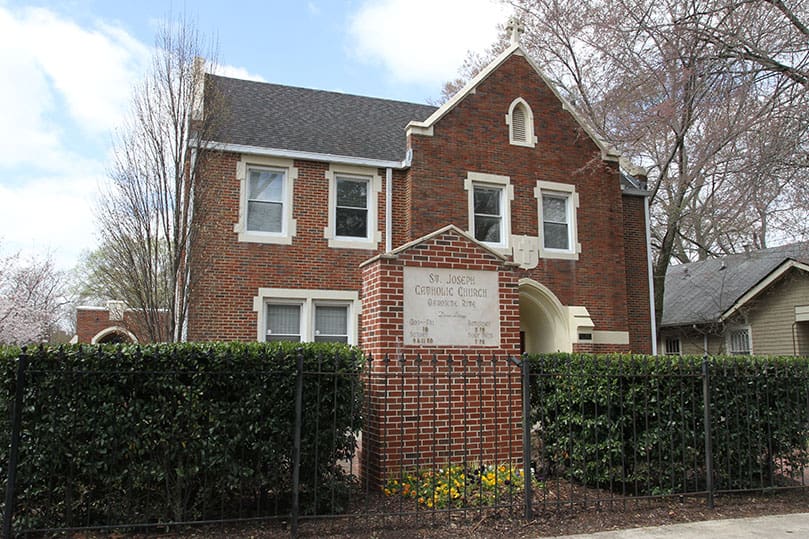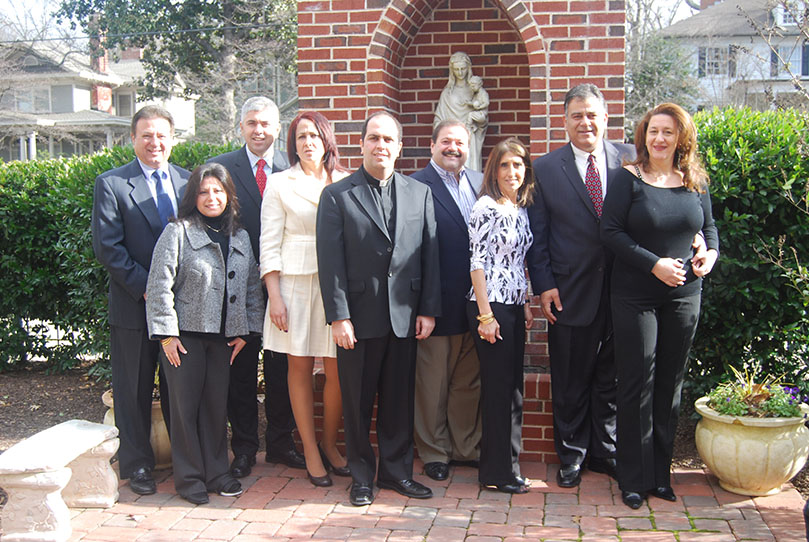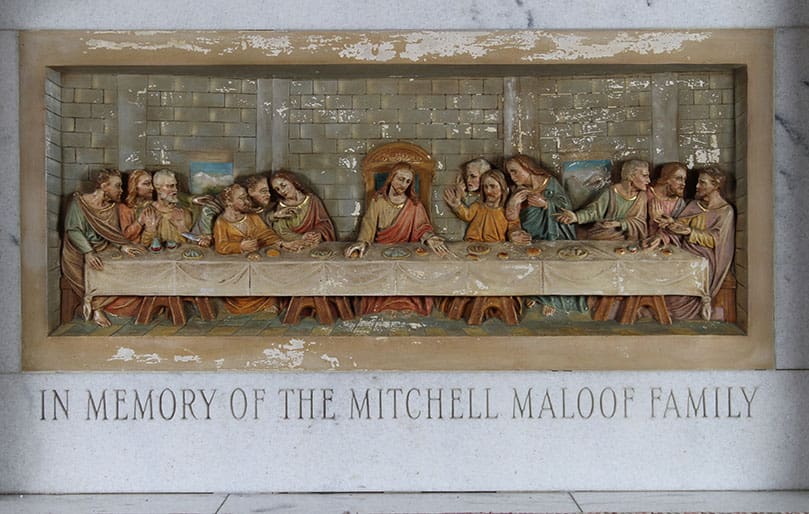Today's existing church building and property at 502 Seminole Avenue, Atlanta, was purchased in 1955. A carved image of the Last Supper appears at the base of the church altar that dates back to the late 1950s. Photo By Michael Alexander
Atlanta
St. Joseph Maronite Church Celebrates 100 Years
By STEPHEN O'KANE, Staff Writer | Published March 31, 2011
In a symbolic act, 100 members of St. Joseph Maronite Church each, in turn, rang a bell following Mass on Sunday, March 20, to represent the 100 years the community has been in Georgia.
It had been over two decades since the sound of the parish’s historic bell echoed throughout the church and the bell ringing was one of many celebratory events that marked the parish centennial. Originally acquired in the early 20th century, the bell rang every Sunday for nearly 40 years before it was forgotten when the parish moved. Discovered again in the late 1970s, the bell was finally refurbished and used in the anniversary weekend’s festivities.
Deep Roots In Atlanta Archdiocese
Members of the Maronite community, an Eastern rite Catholic Church in full communion with Rome, began settling in Georgia in the 1890s. They first came to Latin-rite Mass at the Shrine of the Immaculate Conception in Atlanta until Father Paul Azar was assigned to shepherd them and a makeshift chapel on Butler Street was opened in 1911.
The Maronite community grew to more than 200 families over the last 100 years and moved to a much larger church on Seminole Avenue, near Atlanta’s Little Five Points, in the 1950s.
Father Dominique Hanna, the current administrator, came to the United States from Lebanon in 2002 and was appointed as administrator of St. Joseph’s a little over a year ago. When he arrived, he immediately recognized the strong cultural and familial ties in the community and said he has become a member of that family in his short time in Atlanta. Other Maronite priests, including a former pastor and the vicar general of their province, also celebrated with St. Joseph’s during the anniversary weekend.
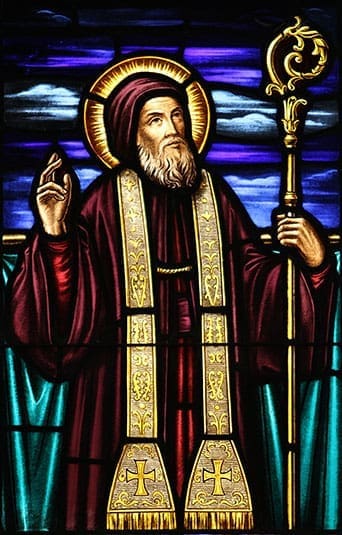
A stained glass window of St. Maron appears on the right side of the church. The entire Maronite Church is named after St. Maron. Photo By Michael Alexander
“It was very special,” Father Hanna said. Michael Hiffa, a parishioner for over 30 years, said that the strong bond among church members extends to their relationship with the Archdiocese of Atlanta.
“The archdiocese has been wonderful to us over the years,” said Hiffa, who noted they always take part in the Eucharistic Congresses and carry their parish banner in the procession.
“We’re very proud that we are a part of the archdiocese,” he said.
Unique Liturgy
St. Joseph’s has also kept its own identity through its unique multi-language liturgy celebrated in Lebanese, Aramaic and English. Hiffa said when he and his wife moved to Georgia from New York in 1980, they came from a much larger Maronite community. But what they found when they arrived was an intimate network of families who took their cultural and religious heritage seriously.
“The first place we came was to this parish,” said Hiffa, who helped arranged many of the anniversary events. “I came here and it was like a little family. … They opened their arms to my wife and I.”
Leo Shababy, 86, and his wife came to St. Joseph Maronite Church around the same time as the Hiffa family. Shababy serves as a subdeacon, usually responsible for assisting priest and deacons during liturgy, and was given an award for his service during the anniversary weekend.
“The church has been my life,” said Shababy, who became a subdeacon in 1999. “I’m not normally a religious person, but I just can’t do without it.”
In addition to celebratory Masses, a banquet brought the entire community together on this occasion.
‘Just The Beginning’
St. Joseph’s path has not always been an easy one. There were spans of time when their numbers dwindled or the parish struggled to find a Maronite-rite priest to serve them. Marist priests, then serving at Sacred Heart Church in Atlanta, helped out during an especially difficult time, said Hiffa. For the last few decades though, the parish has been revitalized and a full-time pastor or administrator has been shepherding the faithful.
“All of us have come from other Maronite communities from across the country or from the homeland, from Lebanon, and found the spirit here,” said Hiffa. “It is a revitalization, a rebirth, of who we are.”
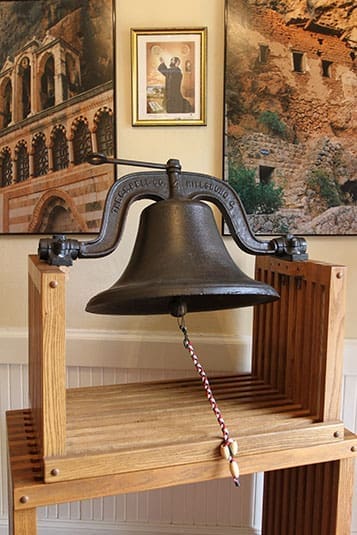
The bell on display in the narthex of St. Joseph Maronite Church was in the church’s bell tower at the Maronite community’s second Atlanta location on Hunter Street, S.E. On the day of the centennial celebration, the bell was rang 100 times, once for each year. Photo By Michael Alexander
“This is just the beginning for us,” he said of the anniversary celebration.
Maronite Catholics, who number about 5.5 million worldwide, trace their heritage to a faith community founded by St. Maron, an early fifth-century monk. The highest concentration of Maronites worldwide is still found in Lebanon, where there are about 1 million Maronite Catholics, and many of Lebanese descent worship in the Maronite rite wherever they have settled. The Maronite community in Georgia is spread out, with members coming from Dacula and Peachtree City to worship at St. Joseph’s. Father Hanna said people come from Nashville, Tenn., for Easter services.
Prelates Offer Congratulations
Words of congratulations to the parish came from Cardinal Nasrallah P. Sfeir, patriarch of the Maronite Catholic Church, Archbishop Pietro Sambi, apostolic nuncio to the United States from the Vatican, and Archbishop Wilton D. Gregory, who celebrated an anniversary Mass with the St. Joseph community on March 19.
“The friendship and affability you exemplify is outstanding in the annals of Atlanta society, and the richness of the liturgical worship you have brought to the fabric of faith in our community is a treasure we cherish,” Archbishop Gregory wrote in a letter to the parish.
“During the course of the parish’s development in its one hundred years, the people of God have gathered as a community of believers to hear the Word of God and to celebrate the Eucharistic Mystery, so that all might grow in their faith and together work for the good of the Church,” wrote Archbishop Sambi. “I pray that through the guidance of the Holy Spirit, St. Joseph Parish will continue to bear abundant fruit. … On this significant anniversary, I am pleased to impart the Apostolic Blessing to all who are associated with St. Joseph Parish, as a sign of the Holy Father’s affection and solicitude.”
“The growth that God gives takes many aspects in the life of the Church. Increasing in number and having a large building might be a sign of development, but mature solidarity between parishioners based on the partaking and sharing of the body of Christ is the growth that God grants his community,” wrote Father Hanna to his parishioners. “Walk with your heads high for what you have achieved is not little. Any community can live a hundred years, but very few can live it as well as you have.”
